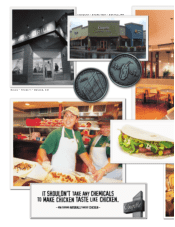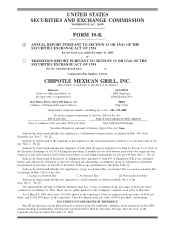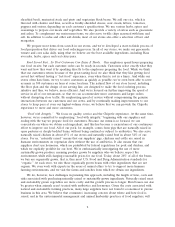Chipotle 2005 Annual Report Download - page 13
Download and view the complete annual report
Please find page 13 of the 2005 Chipotle annual report below. You can navigate through the pages in the report by either clicking on the pages listed below, or by using the keyword search tool below to find specific information within the annual report.(which reflect our often higher ingredient costs), the quality of our operations and general economic
conditions. What’s more, as has happened when other fast-casual restaurant concepts have tried to
expand nationally, we may find that the Chipotle concept has limited or no appeal to customers in
certain new markets or we may experience a decline in the popularity of the Chipotle experience.
Newly opened stores may not succeed, future markets and stores may not be successful and, even if
we’re successful, our average store sales may not increase at historical rates.
As we increase our independence from McDonald’s, we may face difficulties replacing services it currently
provides to us and entering into new or modified arrangements with existing or new suppliers or service
providers.
We’ve benefited from our relationship as a consolidated or majority-owned subsidiary of
McDonald’s. For example, McDonald’s has provided us, directly or through its own vendor
relationships, with accounting services, insurance policy coverage, banking services, health and other
insurance benefits for our employees and employee benefit plans, as well as with its expertise in certain
areas of our operations, such as real estate. We also benefit from our relationship with McDonald’s
when we buy supplies or distribution or other services. For example, McDonald’s relationship with
Coca-Cola has helped us contain our beverage costs, and we’ve relied on the McDonald’s distribution
network. As long as we are a consolidated or majority-owned subsidiary of McDonald’s, we expect to
continue to have some of these advantages, and in connection with our initial public offering we
entered into a services agreement with McDonald’s to clarify our relationship.
Following our initial public offering, McDonald’s now holds beneficial ownership of shares having
about 87% of the combined voting power of our common stock. If McDonald’s ownership interest
declines significantly in the future, we’ll lose an increasing amount of these benefits, many of which will
not be covered by the services agreement. For example, we currently obtain beneficial pricing and/or
service levels from certain suppliers and service providers, and pay McDonald’s for the costs they incur
in administering our 401(k) plan and providing certain health benefits, including workers compensation,
for our employees. If McDonald’s ceases to own more than 80% of the combined voting power of our
outstanding stock, we’ll need to administer our 401(k) plan and provide these health benefits on a
stand-alone basis and could incur increased costs as a result. If McDonald’s ceases to own more than
50% of the combined voting power of our outstanding stock, we may have to pay more for processing
our credit and debit cards and our gift cards, our audit fees, our property insurance, our umbrella and
excess liability premiums and our banking services. In some cases, current benefits, such as the use of
McDonald’s distribution network, are not contractually tied to the level of McDonald’s ownership, and
the relevant suppliers and service providers could decide to stop giving us beneficial pricing and/or
service levels even if McDonald’s still owns a substantial equity stake in us.
As we begin to increase our independence from McDonald’s, we may have to seek new suppliers
and service providers or enter into new arrangements with our existing ones, and we may encounter
difficulties or be unable to negotiate pricing or other terms as favorable as those we currently enjoy,
which could harm our business and operating results. However, because we currently have not begun to
negotiate new or amended contracts with suppliers and service providers, we cannot now quantify with
any certainty potential increases in our expenses. Furthermore, as a public company, in each of 2006
and future years, we expect to incur a few million dollars of legal, accounting and other expenses that
were not previously required to be incurred by us as a private company.
We have no independent operating history as a large company, which makes our future business prospects
difficult to evaluate.
We have been a subsidiary of McDonald’s since 1998, which has affected the way we operate and
manage our business. Because we have no independent operating history as a large company, our
7
























